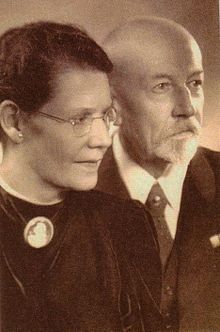Eduard Loch
Eduard Loch (born April 30, 1868 in Memel , † September 30, 1945 in Meiningen ) was a German philologist and student historian in Königsberg (Prussia) .
Life
As the son of Johann Eduard Loch , Loch attended grammar school in Bartenstein . After graduating from high school, he studied classical philology , history , geography and later French at the Albertus University in Königsberg and the Friedrich Wilhelms University in Berlin . 1890 doctorate he became Dr. phil.
Koenigsberg
He passed the senior teacher examination in 1891 and went to the Königliche Wilhelms-Gymnasium in Königsberg as a member of the educational seminar for a seminar year . In 1892/93 he completed the probationary year at the Collegium Fridericianum , where he remained as a volunteer assistant teacher until 1894. From 1895 he was a scientific assistant teacher at the secondary school in Pillau . In the same capacity, he was appointed to the Altstädtisches Gymnasium by the Königsberg magistrate in 1897 . There he was appointed senior teacher in 1900 and high school professor in 1908 . In 1902/03 he was able to travel to Italy with the help of the German Archaeological Institute's travel grant for high school teachers.
From 1913 to 1932, Loch was headmaster of the Königin-Luise-Schule (Königsberg) founded in 1811 . For the 185th anniversary, his daughter Erika and granddaughter Gabriele attended the former girls' school. As the festschrift says, “his 91-year-old daughter vividly described the time of his ministry. The war and post-war years would have put stress on the headmaster, but after that he would have achieved his greatest goal for the school, and that would have made him proud and happy: the humanistic branch was added to the existing secondary school. ” In World War I he received the Cross of Merit for War Aid (Prussia) . In the Weimar Republic since 1922 senior director of studies , he retired in 1932.
After he and his wife had escaped from East Prussia from 1945 to 1950 while fleeing and expelling Germans from Central and Eastern Europe , he died a broken man in Meiningen.
Loch wrote, among other things, about the northwestern Samland and the Curonian Spit . For over 40 years he was involved in the Prussia antiquity society and in the Association for the History of East and West Prussia .
Corp historian
In the summer semester of 1886 he became a member of the Corps Masovia with Paul Hensel and before Wilhelm Kuhr . Loch became the most important historian of the Masurian State Corps . He wrote his story 1905–1910 and the first two volumes of the three-part commemorative publication for the 100th Foundation Festival (1930/33) with new research results on the origin of Masovia. The description of the 70th foundation festival in 1900, the lists of general members for 1925 and 1930/31 and the lists of 1935 and 1940 come from his pen. He was a member of the trust commission and archivist of the corps for over forty years. In 1934 he re- edited the songbook of his corps brother Ludwig Clericus' Albertina with cultural and art-critical considerations. He helped Johannes Hönig with the biography of Ferdinand Gregorovius (1921, 1944). During the Second World War , in agreement with Carl Diesch, he housed the “old, extensive and very valuable archive” in the basement of the State and University Library. Even after the ban in 1941, he edited the corps news printed in Berlin and Königsberg.
Descendants
Loch's daughter Erika Joachim had worked for Carl Diesch in the State and University Library in Königsberg and in the University Library in Göttingen . She died in Göttingen in 2008 at the age of 103. Loch's son Heinz Joachim Loch was a music writer whose daughter Gabriele Joachim lives in Hamburg and looks after the Brahms Museum.
Works
- The division of the Queen Luise School and the introduction of the new director . Koenigsberg 1914
- Dictionary of Ostermann-Müller's Latin Exercise Books , Part 2 (Quinta). 3. Edition. Leipzig 1919
- with Fritz Milkau : Directory of all members of the Corps Masovia. Commemorative publication for the ninety-fifth foundation festival of the Corps Masovia on June 14, 1925 . Koenigsberg 1925
- with Otto Lentschat: hiking map through the north-western Samland . Koenigsberg 1926
- From the oldest student associations in Königsberg 100 years ago . Koenigsberg 1927
- History of the Corps Masovia 1830–1930 . Koenigsberg 1930
- History of the Corps Masovia 1830–1930 , part 2 (1880–1910). Koenigsberg 1933
- The Albertina's illustrated songbook . Koenigsberg 1934
literature
- Rüdiger Döhler (ed.): Corps Masovia. The 175-year history of Königsberg's oldest and Potsdam's first corporation in the 21st century. Munich 2005, ISBN 3-00-016108-2
Web links
- Literature by and about Eduard Loch in the catalog of the German National Library
- Franz Kössler: Teacher Lexicon (PDF; 5.5 MB) University of Gießen, 2007
- Eduard Loch's personnel sheet in the BIL's personnel file in the archive database of the Library for Research on Educational History (BBF)
Individual evidence
- ^ Commemorative publication of the school No. 41 in Kaliningrad (1996)
- ↑ Kösener Corpslisten 1960, 87/809
- ↑ printed in Masovia (2005)
- ↑ Jürgen Herrlein , Amella Mai (ed.): Directory of all members of the Corps Masovia 1823 to 2005 . Potsdam 2006
| personal data | |
|---|---|
| SURNAME | Hole, Eduard |
| BRIEF DESCRIPTION | German philologist and student historian in Königsberg (Prussia) |
| DATE OF BIRTH | April 30, 1868 |
| PLACE OF BIRTH | Memel |
| DATE OF DEATH | September 30, 1945 |
| Place of death | Meiningen |
